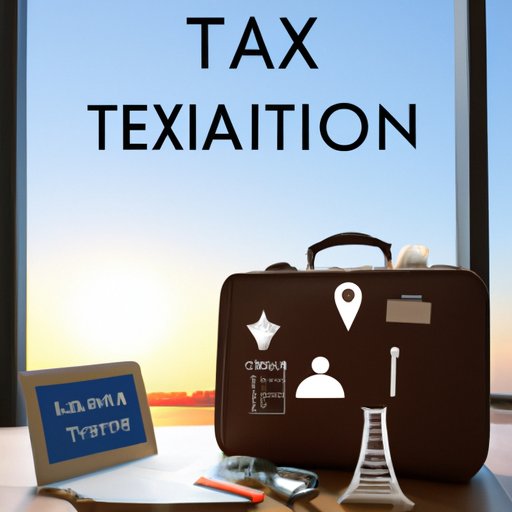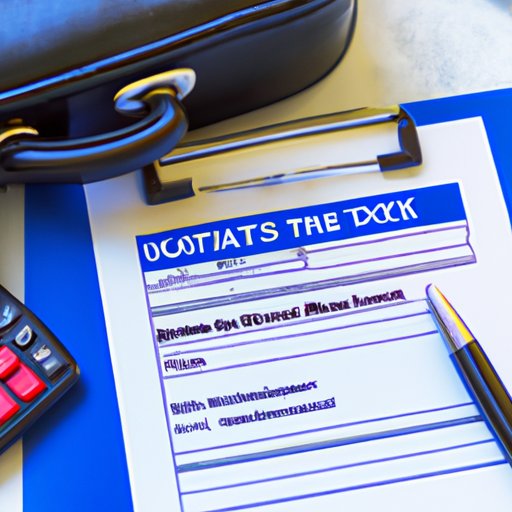Introduction
Businesses often incur significant costs when conducting business travel. From airfare to hotel accommodations and meals, the expenses can quickly add up. Fortunately, many of these costs may be tax deductible. But understanding the rules and regulations surrounding tax deductions for business travel can be complicated. This article will provide an overview of business travel expenses and explain the tax benefits associated with them.

Exploring the Tax Benefits of Travel Expenses for Businesses
When it comes to tax deductions for business travel, the Internal Revenue Service (IRS) allows businesses to deduct a variety of expenses associated with business trips. These include transportation costs such as airfare, car rentals, and taxi fares; lodging expenses such as hotel accommodations and meals; and other related expenses such as conference fees and telephone calls.
The amount that can be deducted depends on whether the trip was necessary for the business and the purpose of the trip. If the trip was primarily for business purposes, then all of the associated expenses are generally deductible. However, if the trip was primarily for personal reasons, then only some of the expenses may be deductible.

How to Maximize Tax Deductions for Business Travel
To maximize tax deductions for business travel, it’s important to keep accurate records of all expenses incurred. This includes receipts for airfare, hotel stays, rental cars, meals, and any other expenses related to the trip. It’s also important to keep track of any reimbursements received from the company or other sources. Reimbursable expenses can help reduce the overall cost of the trip, but they must be reported as income on the tax return.
In addition, it’s important to understand the rules for claiming business travel deductions. The IRS requires that the trip must have been necessary for the business and the expenses must be reasonable. For example, if the trip was for training purposes, then the cost of the training must be reasonable in relation to the needs of the business. Additionally, it’s important to differentiate between personal and business expenses. Personal expenses, such as sightseeing or entertainment, cannot be deducted.
What Are the Rules for Deducting Business Travel Expenses?
The IRS has specific rules for deducting business travel expenses. All expenses must be documented and must be “ordinary and necessary” for the business. This means that the expense must be reasonable in relation to the needs of the business and must not be lavish or extravagant. Additionally, the trip must have been taken for business purposes and must not have been primarily for personal reasons.
It’s also important to calculate travel expenses correctly. The IRS allows businesses to deduct certain types of travel expenses, such as airfare and hotel accommodations, based on the actual cost of the expenses. Other expenses, such as meals and incidentals, may be deductible at a rate of 50 percent. Furthermore, it’s important to note that the IRS does not allow businesses to deduct expenses that are considered to be personal in nature, such as sightseeing or entertainment.

The Basics of Claiming Tax Deductions on Business Travel
When claiming tax deductions on business travel, it’s important to understand the IRS rules for deducting travel expenses. In general, businesses are allowed to deduct the cost of transportation, lodging, meals, and other expenses related to the trip. However, the IRS requires that all expenses must be reasonable and ordinary in relation to the needs of the business. Additionally, the trip must have been taken for business purposes and must not have been primarily for personal reasons.
It’s also important to meet the requirements for claiming business travel expenses. The IRS requires that all expenses must be documented and that the taxpayer must be able to demonstrate that the trip was necessary for the business. Additionally, the taxpayer must be able to prove that the expense was reasonable and ordinary in relation to the needs of the business. Finally, the taxpayer must be able to demonstrate that the expense was not primarily for personal reasons.
A Guide to Claiming Business Travel Expenses on Your Taxes
Claiming business travel expenses on your taxes can be complicated, but there are steps you can take to make the process easier. First, it’s important to understand what is reasonable for business travel expenses. The IRS allows businesses to deduct reasonable and ordinary expenses related to business travel, but the taxpayer must be able to demonstrate that the expense was necessary for the business. Additionally, the taxpayer must be able to differentiate between deductible and non-deductible travel expenses.
It’s also important to keep accurate records of all business travel expenses. This includes receipts for airfare, hotel stays, rental cars, meals, and any other expenses related to the trip. Additionally, it’s important to keep track of any reimbursements received from the company or other sources. Reimbursable expenses can help reduce the overall cost of the trip, but they must be reported as income on the tax return.
Finally, it’s important to understand the tax implications of business travel expenses. Knowing when business travel expenses are taxable can help taxpayers avoid costly mistakes. Additionally, it’s important to know how to report business travel expenses on your tax return. In general, taxpayers should report business travel expenses on the appropriate line of their tax return.
What You Need to Know About Deducting Work-Related Travel Expenses
Deducting work-related travel expenses can be confusing, but it’s important to understand the eligibility requirements for claiming these expenses. Generally, the IRS requires that the trip must have been necessary for the business and the expenses must be reasonable. Additionally, the taxpayer must be able to differentiate between personal and business expenses. To maximize deductions, it’s important to keep accurate records of all expenses and to report reimbursements as income on the tax return.
There are also some common questions about deducting work-related travel expenses. For example, can meals and entertainment expenses be deducted? The answer is yes, but only if the expenses are reasonable and ordinary in relation to the needs of the business. Additionally, can I deduct transportation expenses from my home to my business destination? The answer is yes, but only if the trip is for business purposes and the expense is reasonable.
Conclusion
Businesses can benefit from tax deductions for business travel expenses. By understanding the rules and regulations surrounding tax deductions for business travel, businesses can maximize their deductions and lower their tax liability. Additionally, businesses should keep accurate records of all expenses and differentiate between personal and business expenses. By following these guidelines, businesses can ensure that they are taking full advantage of the tax benefits of business travel.
This article provides an overview of the tax benefits associated with business travel expenses and offers tips on how to maximize deductions when claiming work-related travel expenses. Understanding the rules and regulations surrounding tax deductions for business travel can help businesses save money and reduce their tax liability.
(Note: Is this article not meeting your expectations? Do you have knowledge or insights to share? Unlock new opportunities and expand your reach by joining our authors team. Click Registration to join us and share your expertise with our readers.)
